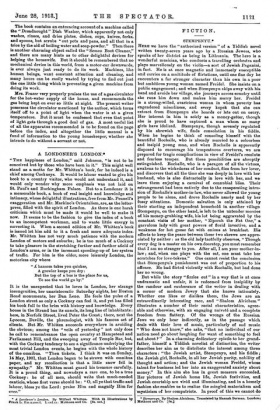A LONDONER'S LONDON.* "THE happiness of London," said Johnson, "is
not to be conceived but by those who have been in it." This might well stand as a motto for Mr. Whitten's book, for he indeed is a chief among Cockneys. It would be labour wasted to give his book to a country visitor, who would not understand it, and would only wonder why more emphasis was not laid on St. Paul's and Buckingham Palace. But to a Londoner it is a memorable book, a book of real insight and knowledge and intimacy, whose delightful illustrations, free from Mr. Pennell's exaggeration and Mr. Markino's Orientalism, are, as the letter- press, filled with the spirit of London. As there is one harsh criticism which must be made it would be well to make it now. It seems to be the fashion to give the index of a book to an incompetent workman, and to waste little energy in correcting it. When a second edition of Mr. Whitten's book is issued let him add to it a fresh and more adequate index. Mr. Whitten has not very much patience with the modern London of motors and suburbs ; be is too much of a Cockney to take pleasure in the stretching further and further afield of London's arms, or in the incessant speeding-up of her system of traffic. For him is the older, more leisurely London, the motorless city where
"S hansom takes you quicker, A growler keeps you dry: But the top of a bus is the place for us,
To see the world go by."
It is the unexpected that he loves in London, her strange incongruities, her unaristocratic Saturday nights, her Euston Road monuments, her Dan Leno. He feels the pulse of a London street as only a Cockney can feel it, and yet has filled his book full to the brim with history and knowledge. Every house in the Strand has its annals, its long line of inhabitants : here, in Norfolk Street, lived Peter the Great; there, next the Lyceum, Deville, the phrenologist, with his famous set of clients. But Mr. Whitten succeeds everywhere in avoiding the obvious; among the "veils of yesterday" not only does he call to remembrance the open country at Hampstead and Parliament Hill, and the sweeping away of Temple Bar, but, with the Cockney tendency to see a significance underlying the most trivial London events, he begins with the whole history of the omnibus. " Then tickets. I think it was on Sunday, 14 May, 1901, that London began to be strewn with omnibus paper, and my recollection is that a little snow fell in sympathy." Mr. Whitten must guard his treasure carefully. It is a proud thing, and nowadays a rare one, to be a true Cockney : be of all men, should write that much-needed canticle, whose first verse should be : " 0, all ye that traffic and labour, bless ye the Lord: praise Him and magnify Him for ever."
" A Londoner's London. By Wilfred Whitten. With 24 Illustrations by
Frank L. Em.u.xuu21. L Mathuen and Co. [6s. net.]


























































 Previous page
Previous page